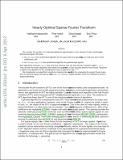Nearly optimal sparse fourier transform
Author(s)
Hassanieh, Haitham; Indyk, Piotr; Katabi, Dina; Price, Eric C.
DownloadKatabi_Nearly Optimal.pdf (298.5Kb)
OPEN_ACCESS_POLICY
Open Access Policy
Creative Commons Attribution-Noncommercial-Share Alike
Terms of use
Metadata
Show full item recordAbstract
We consider the problem of computing the k-sparse approximation to the discrete Fourier transform of an n-dimensional signal. We show: An O(k log n)-time randomized algorithm for the case where the input signal has at most k non-zero Fourier coefficients, and An O(k log n log(n/k))-time randomized algorithm for general input signals.
Both algorithms achieve o(n log n) time, and thus improve over the Fast Fourier Transform, for any k=o(n). They are the first known algorithms that satisfy this property. Also, if one assumes that the Fast Fourier Transform is optimal, the algorithm for the exactly k-sparse case is optimal for any k = n[superscript Ω(1)].
We complement our algorithmic results by showing that any algorithm for computing the sparse Fourier transform of a general signal must use at least Ω(k log (n/k) / log log n) signal samples, even if it is allowed to perform adaptive sampling.
Date issued
2012-05Department
Massachusetts Institute of Technology. Computer Science and Artificial Intelligence Laboratory; Massachusetts Institute of Technology. Department of Electrical Engineering and Computer ScienceJournal
Proceedings of the 44th Symposium on Theory of Computing (STOC '12 )
Publisher
Association for Computing Machinery (ACM)
Citation
Hassanieh, Haitham et al. “Nearly Optimal Sparse Fourier Transform.” Proceedings of the 44th Symposium on Theory of Computing (STOC '12 ). 563.
Version: Author's final manuscript
ISBN
978-1-4503-1245-5